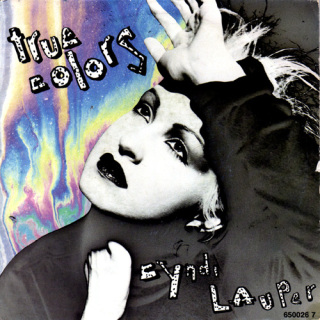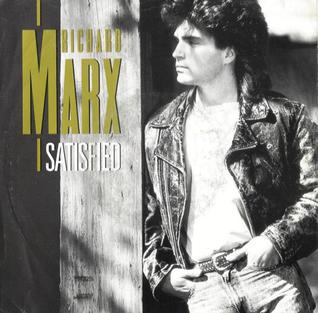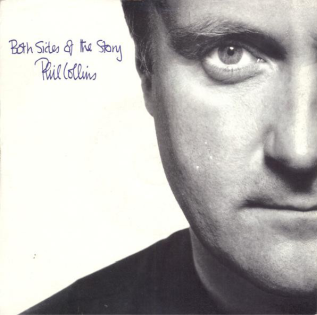
"Another Day in Paradise" is a song written and recorded by English drummer and singer Phil Collins. Produced by Collins along with Hugh Padgham, it was released as the first single from his number-one album ...But Seriously (1989). As with his song for Genesis, "Man on the Corner", the track has as its subject the problem of homelessness and paradise; as such, the song was a substantial departure from the dance-pop music of his previous album, No Jacket Required (1985).

"You Got It" is a song from American singer Roy Orbison's 22nd studio album, Mystery Girl (1989). The song was released posthumously on January 3, 1989, after Orbison's death from a heart attack on December 6, 1988. The song was issued with "The Only One" as the B-side and was later released with "Crying". The single reached number nine on the US Billboard Hot 100 and number one on the Adult Contemporary chart, returning Orbison to the top 10 for the first time in 25 years. "You Got It" also reached number three on the UK Singles Chart and entered the top five in 10 other countries. Although it is an Orbison solo single, Orbison's fellow Traveling Wilburys bandmates Tom Petty and Jeff Lynne co-wrote the song and played instruments on the record.

"No Son of Mine" is a song by British rock group Genesis, released in October 1991 by Atlantic and Virgin as the lead single from their 14th album, We Can't Dance (1991). The song, written by Phil Collins and composed by him with Tony Banks and Mike Rutherford, reached No. 6 on the UK Singles Chart and No. 12 on the US Billboard Hot 100. It was also a top-10 hit in several European countries and peaked atop Canada's RPM 100 Hit Tracks chart for five weeks.

"True Colors" is a number one hit song written by American songwriters Billy Steinberg and Tom Kelly. It was both the title track and the first single released from American singer Cyndi Lauper's second studio album of the same name (1986). Released in mid-1986, the song spent two weeks at number one on the US Billboard Hot 100, being Lauper's second and last single to occupy the top of the chart. It received a Grammy Award nomination for Best Female Pop Vocal Performance.

"Easy Lover" is a song performed by Philip Bailey of the band Earth, Wind & Fire and Phil Collins of the band Genesis, jointly written and composed by Bailey, Collins, and Nathan East. The song appears on Bailey's solo album, Chinese Wall. Collins has performed the song in his live concerts, and it appears on both his 1990 album, Serious Hits... Live!, and his 1998 compilation album, ...Hits. It is Bailey's only US Top 40 hit as a solo artist.

"She Drives Me Crazy" is a song by British group Fine Young Cannibals, released in 1988 by London Records as the first single from their second and final album, The Raw & the Cooked (1989). The song was written by the group's frontman Roland Gift with David Steele and produced by FYC with David Z. It peaked at number five on the UK Singles Chart in January 1989, becoming the band's highest charting single. "She Drives Me Crazy" proved an even bigger hit in the US, topping the Billboard Hot 100 on 15 April 1989 for one week and becoming the first of two chart-topping singles for the band on that chart. It also reached No.1 on the Billboard Hot Dance Music/Club Play Singles chart, as well as in countries including Australia, Austria, Canada, New Zealand and Spain. It reached the top 3 on several European charts including Belgium, West Germany, Iceland, Ireland and Switzerland. Two different music videos were produced for the song, directed by Philippe Decouflé and Pedro Romhanyi.

"Right Here Waiting" is a song by American singer and songwriter Richard Marx. It was released on June 29, 1989, as the second single from his second album, Repeat Offender (1989). The song was a global hit, topping charts in many countries around the world, including Australia, Canada, Ireland, New Zealand, and the United States where it reached number one on the Billboard Hot 100. The same year, it was certified platinum by the Recording Industry Association of America (RIAA). It was the UK's most streamed love song on Spotify ahead of Valentine's Day in 2013 and has since been covered by many artists, including R&B singer Monica.

"Satisfied" is a song by American singer-songwriter Richard Marx, released as the lead single from his second album, Repeat Offender (1989). It was Marx's second of three consecutive number-one singles on the US Billboard Hot 100 singles chart and became a top-20 hit in Australia and Canada.

"I Wish It Would Rain Down" is a song by English musician Phil Collins from his fourth solo studio album, ...But Seriously (1989). The song was a chart success in early 1990, peaking at No. 7 on the UK Singles Chart, No. 3 on the US Billboard Hot 100 and No. 1 on the Canadian RPM 100 Singles chart; in the latter country, it was the most successful song of 1990. Collins felt that it was as close as he had ever got, at the time, to writing a blues song.

"Woman in Chains" is a song by English band Tears for Fears, released as the second single from their third studio album, The Seeds of Love (1989). It has been described as a "feminist anthem". It was an international success, reaching the top 40 in several countries, including the United Kingdom, the United States, Canada, France, and the Netherlands.

"Something Happened on the Way to Heaven" is a song by English drummer Phil Collins, released in April 1990 from his fourth studio album, ...But Seriously (1989). The song peaked at No. 4 on the US Billboard Hot 100 the week of October 6, 1990 and No. 15 on the UK Singles Chart. A live version also appears on the Serious Hits... Live! album. The song is often identified by the recurring hook of "How many times can I say 'I'm sorry'?", however, the title of the song is essentially the 2nd line of the 2nd verse.

"Both Sides of the Story" is a song performed by English singer-songwriter, drummer, actor and lead singer of English rock band Genesis, Phil Collins. The song was released in October 1993 by Virgin, WEA and Atlantic as the lead single from his fifth album, Both Sides (1993). The song reached number seven on the UK Singles Chart, and numbers 25 and 20 on the US Billboard Hot 100 and Cash Box Top 100. It charted the highest in Canada, peaking at number two on the RPM Top Singles chart. The single's B-sides vary, as copies of the single include either "Always" or "Rad Dudeski".

"Everyday" is a song by English musician Phil Collins, released as the second single of his fifth studio album, Both Sides (1993). The single achieved success mostly in North America in early 1994. In 2004, it was included as the seventh track on Collins' compilation album Love Songs: A Compilation... Old and New.

"The Motown Song" is a song performed by British singer Rod Stewart featuring American vocal group the Temptations. The song is from Stewart's 16th studio album, Vagabond Heart (1991). It was written by Larry John McNally and was originally recorded by McNally for the soundtrack to the film Quicksilver in 1986. McNally recorded a new version 2015 for the compilation I. C. Independent Celebration, Vol. 1 for the German label Birdstone Records.

"Hero" is a single performed by American singer-songwriter David Crosby from his third studio album, Thousand Roads (1993). The recording, released in April 1993 by Atlantic, features English drummer Phil Collins, who co-wrote the song with Crosby, produced it, sang backing vocals, and played drums, keyboards, and drum machine. Collins released a demo version, featuring his vocals only, as a B-side to the "We Wait and We Wonder" single release.



















